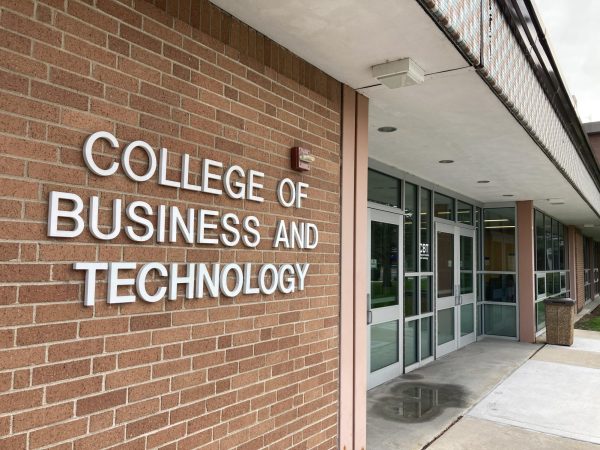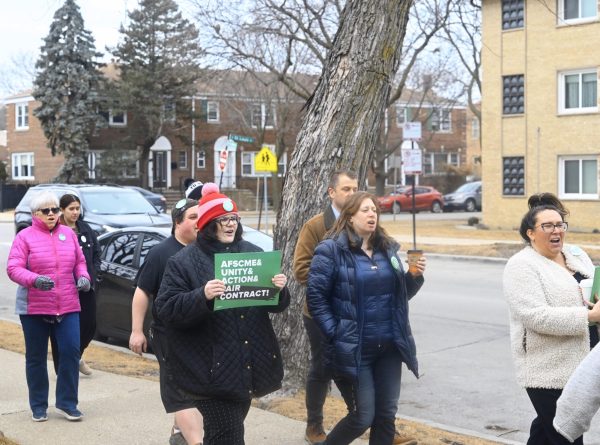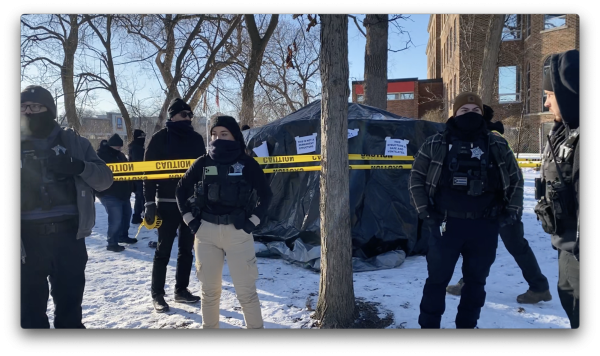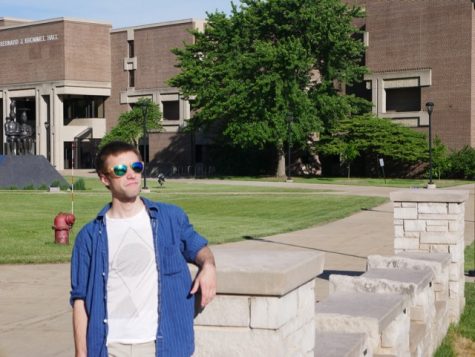Board of Trustees Approves Fee Increases for Fiscal Year 2017
More in News
The Board of Trustees (BOT) voted to increase tuition and fees for fiscal year 2017 (FY17) at their Nov. 19 meeting. FY17 begins on July 1 of 2016 and ends on June 30 of 2017.
The decision was made as the university enters its sixth month without state funding.
The tuition increase will affect the 41 percent of NEIU’s student body whose tuition rates are not locked with their year of enrollment. This number will include new students arriving in the fall of 2016, all graduate students and undergraduates who have attended the university for more than six years.
Undergraduates are protected from tuition hikes for their first six years attending the university, after which their tuition is increased to match the rate charged to new students. The fee increases will apply to all students at the university.
Both of the new rates will go into effect in the fall semester of 2016.
New students and undergraduates enrolled for more than six years (post-six year undergraduates) will shoulder a tuition increase of $27.37 per credit hour. All graduate students will likewise face a tuition increase of $28.36 per credit hour.
Students who have had a tuition freeze since the fall of 2012 will see their tuition increase by $12 in fall 2016 to match the tuition rates of students who enrolled in the fall of 2013.
The fee hike will be applied equally to all students.
The increases in the student activity fee, student union fee, the campus recreation fee and performing arts fee will be used in part to extend the University’s services for longer periods of time so that future students living on campus will have access services at night and on the weekend.
The parking fee, which can be waived by students at the financial aid office, will be decreased by $1.50. The campus improvement fee, which cannot be waived, will be increased by the same amount.
Increases to the student health services fee will be used to extend coverage of those services to NEIU’s El Centro and Jacob H. Carruthers Center for Inner City Studies (CCICS).
Provost Richard Helldobler explained the rationale behind this fee’s increase during the BOT committee meetings.
“A student on the south side — at the Carruthers Center — if they want (health or counseling services), has to travel to the main campus. And likewise at El Centro,” he said. “Additionally, with the residence halls coming up, we would have to have some sort of coverage, either on call or referral, in the evenings and during the weekends.”
“It’s really the additional delivery of services at El Centro and CCICS, which is a long time coming,” he added. “We should have had that
The only new fee to be added for next fall is a $3 library fee. According to the president’s report to the BOT, the library fee will “provide for the purchase of books, journals and databases to support student curricular and scholarship needs, as well as selected improvements to the library spaces. It will also support our AACSB (Association to Advance Schools of Business) accreditation efforts for the College of Business and Management.”
Carlos Melian, the dean of libraries, said he spoke to the provost last spring about creating a small fee bolster the library’s funding. As resources grew tight, the library purchased fewer books, canceled most of its print subscriptions and directed funding towards its databases. One of the advantages of the databases, he said, was their immediate accessibility to students on the satellite campuses.
“The databases — electronic content — are very expensive,” he said. “If we cancel one, because the databases come as a package from their publisher, we lose a lot of them.”
“We’re going to concentrate on buying a lot of books,” Melian said. “Our library is starting to look older and our book collection is outdated by about three or four years.”
He explained that as the library’s resources became strained the priority went to funding the electronic databases.
***
On July 1, the university loaded a preliminary budget for FY2016. It was built around Senate Bill 2029, an act drafted to provide state funding for Illinois public universities that would have appropriated $34.5 million to NEIU — an 8.6 percent cut from the previous year’s appropriation. The bill passed both the senate and the house but was ultimately vetoed by Gov. Bruce Rauner.
Without the state appropriation, which accounted for 38 percent of the FY2016 preliminary budget, the university would need to run on its income fund — the combined revenue from tuition and fees — until the resumption of state funding.
“Typically, the way you build a budget is based on the current year’s budget going forward,” said Michael Pierick, vice president for finance and administration, in an address to the Student Government Association (SGA) at their Oct. 6 meeting. “And typically, we build the following year’s tuition and fee proposals on this year’s budget as well. But this year, we don’t know that.”
The tuition and fees for FY2017 were based in part on the $34.5 million appropriation expected last summer, but because that cut never came in — and because the final budget cut will likely be greater than 8.6 percent — they would also need to be able to cover additional cuts to the state appropriation.
The new rates would need to be set without a solid financial reference point.
The trustees were presented with three tuition rates, representing a range of 6 to 10 percent, to vote on. The base rates were set at 6.2 percent on the low end, 8.1 percent and 9.9 percent on the high end. The budget scenarios represented cuts of 0, 5 and 10 percent from the $34.5 million figure loaded in the FY2016 budget.
Trustee Jonathan Stein argued for the higher end — the 9.9 percent increase while Trustee Chair Carlos Azcoitia, Trustee Omar Duque believed the middle ground, what would become the 8.5 percent increase, was the safer bet.
Student Trustee Pedro Nungaray told the board that students he had spoken to were understanding of a tuition increase around 8 percent, but that they were much less receptive to the fee increases.
The 6.2 percent increase saw it’s only advocate in Vice Chair Jin Lee.
He said the university needed to take a more innovative approach to resolving the budget crisis, speaking most specifically on the potential for improved recruitment rates among Chicago high school graduates.
“This is the wrong answer,” he said, referring to the tuition increases. “If you stick to the same old stereotype paradigm you’re not going to go anywhere and this will be continued every single year because of the state’s situations.”
Your donation will support the student journalists of Northeastern Illinois University's The Independent, either in writers' payment, additional supplies and other items of note. Your contribution will allow us to purchase additional equipment for writers/photographers/illustrators and cover our annual website hosting costs.









